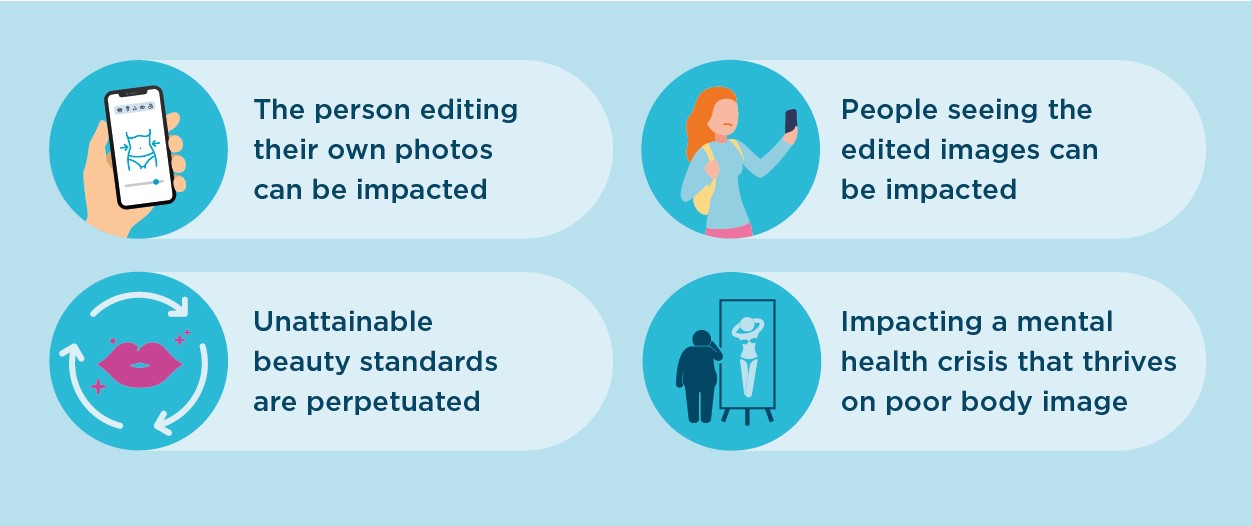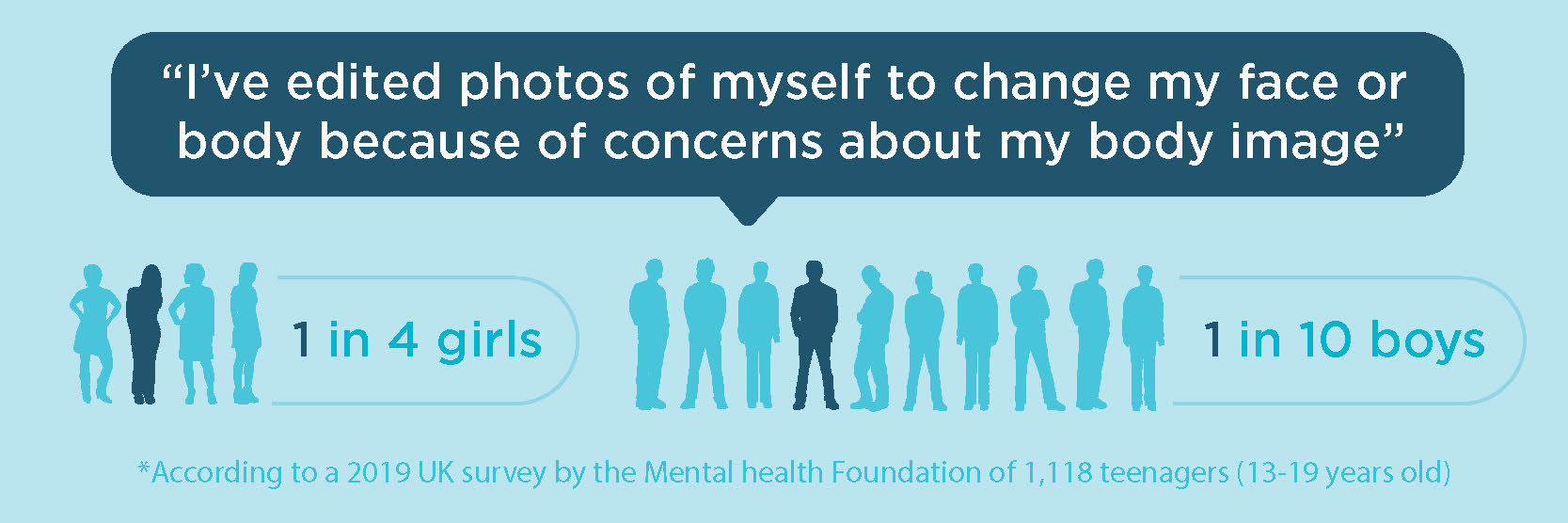Can online image editing on social media contribute to eating disorders?
We have explored whether the rising popularity of image-editing features has increased social media’s associated risks around mental health challenges and eating disorders.
We have explored whether the rising popularity of image-editing features has increased social media’s associated risks around mental health challenges and eating disorders.


The impact of social media on mental health has become painfully clear in recent years. As technology develops and people spend more time online, audiences are more and more exposed to the harmful effects of these platforms. Not only do they promote constant unhealthy comparisons with other people, they blur the lines of reality in a way that makes it impossible to live up to the imaginary world we see online, possibly resulting in poor mental health, body dysmorphia and eating disorders.
The rising popularity of photo-editing features are facilitating the make-believe aspect of social media in worrying new ways. They casually encourage the habit of creating a false visual narrative for ourselves, which isn’t just about giving the impression of an enviable lifestyle anymore – it’s around how we actually look.
At the tap of a screen, filters on Instagram, Facebook and others, along with dedicated photo-editing apps such as Facetune, allow facial features to be sculpted, blemishes eliminated and body proportions altered. Rather than this manipulation of the truth being a new idea, it's an extension of what social media users have been doing for years; maintaining an illusion of perfection with a carefully-curated online presence.
These increasingly sophisticated filters and editing tools now allow this fantasy to be constructed to worrying new levels. The edited content they can produce, ever further removed from real life, is constantly at the fingertips of social media users who frequently have their phone nearby. This can lead to feelings of inferiority or negative self-image, at any time of the day or night. These negative beliefs around self-image can eventually lead to deeply damaging behaviours, like body dysmorphia, which is how eating disorders start. Once an eating disorder, such as anorexia or bulimia, takes control of your life, treatment is usually the best course of action for restoring emotional wellbeing and a healthier relationship with food and your own body.

Of course, presenting a fictional version of ourselves is bound to have serious consequences on self-esteem over time. These retouched images can erode the confidence of both the people creating them and the people viewing them. A negative view on body image and body dysmorphia are common results of photo editing. Photo editing allows anyone to pursue specific, idealised and unachievable beauty standards, hiding our real selves from the world and discarding any notion of accepting our flaws and differences.
Seeking acceptance from others online in this manner is highly damaging in various ways; a leading issue is that it ties our self-worth with our physical appearance. Social media brings a huge amount of pressure to conform to what others will deem attractive, which perpetuates negative beliefs around our body. Greater ‘body dissatisfaction’ is linked to increased symptoms of mental health conditions and can result in a higher risk of eating disorders.
A 2019 study showed how the internet is changing our brain function, particularly with the ‘digital manipulation of images to inflate physical attractiveness’. The time spent on social media was shown to correlate with mental health problems, including depression and suicidal feelings, in teenagers, particularly girls. Research has shown that the majority of young people spend more than 2 hours per day on social media, so it's clear why there's a growing mental health crisis among this age group.

The above study also discussed how social media’s impact on body image stems from the way it ‘showcases hyper‐successful individuals, constantly putting their best foot forward’. In that same vein, the struggle with embracing our real, unfiltered identity is worsened by the fact that influencers are editing their content too. When celebrities make their aspirational existence seem that much more unattainable, the disconnect between reality and fantasy grows even wider. Not only are our friends airbrushing their appearance, supermodels are making their waists look even thinner too. This means that existing role models become even more unrealistic to live up to, as their followers – the people who look up to them and constantly compare themselves to them – judge their own bodies based on an artificial reality. The impact on self-worth then becomes even more devastating due to the huge reach of these influencers, with a single edited photo bringing out insecurities in thousands or millions of people.
A 2019 Mental Health Foundation study among teenagers (aged 13 to 19), showed that 1 in 4 girls and 1 in 10 boys had edited their face or body in digital photos, due to poor body image, which could result in severe body dysmorphia later on in life. The study also found that over a third of young adults (aged 18 to 24) had recently felt shame over their body image, with one in four feeling overwhelmed by their negative feelings about their appearance. The harm caused by the online world doesn’t just affect teenagers. 22% of the adult age group in the study said they had worried about their body image as a result of the posts they saw on social media.
Another 2019 study showed how social media has encouraged a rise in the desire for cosmetic surgery among women aged 18 to 29. This means that its impact is becoming clearer than ever, causing people to alter their appearance not only online, but in real life too. A 2016 study also showed the impact on body image of even older women in middle age and beyond, due to the over-representation and glorification of youth in the media. When it comes to social media and photo-editing apps in particular, however, it does seem logical that the effects on self-esteem are worse among younger age groups, who are the biggest users of these platforms.
It was already the case in 2019 that 82% of people were using the internet every day, with 91% of 16 to 24 year olds spending their time online mainly using social media. Social platforms can, to some extent, be used for emotional support by allowing connection with others. However, negative online influences only worsen as we live more of our lives online.
A critical issue with our increasing use of technology is that the increased exposure to online images can result in a higher risk of body dysmorphic behaviours. Many of us are suddenly much more aware of how we present ourselves to others day-to-day, as we see ourselves reflected back on our screens during video calls. At the same time, increased time on social media means seeing more of others online than ever before, becoming more used to what they look like through technology than in reality. If many of those people are also editing their digital appearance, the risks of unrealistic comparisons are clearly now higher than in previous years, when we didn’t spend so much spare time online.
Those who already have eating disorders can be highly vulnerable to the pitfalls of social media, with their body image and self-esteem particularly low. People who suffer from conditions such as body dysmorphic disorder (BDD) already have a distorted perception of their weight and appearance, so are even more susceptible to the potential damage of people misrepresenting what they look like online. Those with BDD will become fixated on their perceived imperfections, and can experience obsessive and controlling thoughts which may result in harmful behaviours such as restricting food intake, binging, purging, over-exercising and isolating themselves from friends and family.
One of our clients has spoken about how she had struggled with body image for a long time before getting treatment, with the photos she saw online being particularly triggering for her.
"Before coming into treatment, I struggled with my body image from a very young age. I would avoid anything that would show any part of me, like mirrors and pictures. Over many years, I only uploaded about three photos of myself to one of my social media accounts, because I always found something to criticise and feel overly self-conscious about. I also compared myself a huge amount to people I followed on social media.
"Any picture that had a person in, I would compare every part of their body to mine and inevitably, I would always think they were better looking than I was and I would feel that that was the reason they were so much happier than I felt.
"In order for me to be happy, go out and have fun, I thought (and sometimes still think) that I need to be as thin as (if not thinner than) the people I saw on social media.
"Being at Priory has helped me realise how much of social media is fake and portrayed to be 'perfect' when actually, pretty much everything is edited, photoshopped and glazed over with a filter to make everyone look more ‘idealistic’, but this standard is completely unrealistic.
"Being here also helped me to escape this trap of getting caught up in hundreds of triggering photos, by helping me to unfollow the people that had a negative impact on my mental health/self-esteem and find positive, sustainable accounts that promote natural bodies and appearances.
"Thanks to Priory, I'm now able to tell myself and believe (most of the time) that the photos I see on social media and magazines of others’ bodies, are fake and that my standards were/are very unrealistic. Currently, I am following multiple body positive accounts and only one account that has photos I find challenging, but because I think it's important not to completely hide away from triggering images online.
"As well as changing my focus to my qualities, I've also learnt to have gratitude for parts of my body (including areas that I dislike) based on what they provide me with. For example, I am grateful for my legs because they allow me to walk and have independence. I have found, thanks to the advice and encouragement of the staff here, that wearing clothes I would usually avoid due to high levels of discomfort has helped me to build some confidence around my body. The environment at Priory has been especially good for this type of exposure as I know that I have full support and no judgement from others.
"I would really advise others to try and change their focus of themselves to things such as their personality, qualities and things they can be grateful about, in regards to their body. I can imagine that, like myself, others might feel disheartened at times and want to give up, but it's important to remember that those are the times when it's most important to push through and keep going with the work they've been doing."
